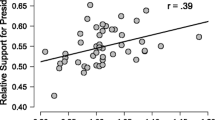Abstract
We argue that intelligible appeals to interlevel causes (top-down and bottom-up) can be understood, without remainder, as appeals to mechanistically mediated effects. Mechanistically mediated effects are hybrids of causal and constitutive relations, where the causal relations are exclusively intralevel. The idea of causation would have to stretch to the breaking point to accommodate interlevel causes. The notion of a mechanistically mediated effect is preferable because it can do all of the required work without appealing to mysterious interlevel causes. When interlevel causes can be translated into mechanistically mediated effects, the posited relationship is intelligible and should raise no special philosophical objections. When they cannot, they are suspect.
Similar content being viewed by others
References
Alexander S. (1927). Space, Time and Deity, vol.2. London, Macmillan
Anderson P.B., Emmeche C., Finnemann N.O. and Christiansen P.V. (eds) 2000. Downward Causation. Aarhus University Press, Denmark
Bechtel W. (2006). Discovering Cell Mechanisms: The Creation of Modern Cell Biology. Cambridge, Cambridge University Press
Bechtel W. (in press). The epistemology of evidence in cognitive neuroscience. In: Skipper R. Jr., Allen C., Ankeny R.A., Craver C.F., Darden L., Mikkelson G. and Richardson R. (eds), Philosophy and the Life Sciences: A Reader, co-editor with responsibility for section on philosophy of medicine, MIT Press.
Bechtel W., Richardson, R.C. (1993). Discovering complexity: Decomposition and Localization as Scientific Research Strategies. Princeton, NJ, Princeton University Press
Boogerd F.C., Bruggeman F.J., Richardson R.C., Stephan A., Westerhoff H.V. (2005). Emergence and its place in nature: A case study of biochemical networks. Synthese 145:131–164
Campbell D.T. 1974. ‘Downward causation’ in hierarchically organized biological systems. In: Ayala F.J. and Dobzhansky T. (eds), Studies in the Philosophy of Biology, Macmillan Press Ltd, NY
Churchland P.S. (1993). Can neurobiology teach us anything about consciousness? Proc. Addresses Am. Phil. Assoc. 67:23–40
Churchland P.S., Sejnowski T. (1992). The Computational Brain. Cambridge, MA, MIT Press
Craver C.F. (2001). Role functions, mechanisms, and hierarchy. Phil. Sci. 68:53–74
Craver C.F. (2002). Interlevel experiments and multilevel mechanisms in the neuroscience of memory. Phil. Sci. 69:S83–S97
Craver C.F. Explaining the Brain. Oxford University Press, Oxford (forthcoming)
Dowe P. (2000). Physical Causation. New York, Cambridge University Press
Eichenbaum H. (2002). The cognitive neuroscience of memory: an introduction. Oxford, Oxford University Press
Emmeche C., KØppe S. and Stjernfelt S. (2000). Levels, emergence, and three versions of downward causation. In: Anderson P.B., Emmeche C., Finnemann N.O. and Christiansen P.V. (eds) Downward Causation. Aarhus University Press, Denmark, pp. 13–34
Faye J. 2005. Backwards Causation. Stanford Encyclopedia of Philosophy, http://www.plato. stanford.edu/entries/causation-backwards/ Accessed November, 2005
Glennan S.S. (1996). Mechanisms and the nature of causation. Erkenntnis 44: 49–71
Hitchcock C. (2003). Of Humean bondage. Br. J. Phil. Sci. 54: 1–25
Kandel E., Schwartz E. and Jessel T.M. 1991. Principles of Neuroscience. Elsevier
Kim J. (2000). Making sense of downward causation. In: Anderson P.B., Emmeche C., Finnemann N.O., Christiansen P.V. (eds) Downward Causation. Aarhus University Press, Denmark, pp. 305–321
Lewis D. 2000. Causation as influence. Reprinted in Collins J., Hall N. and Paul L.A. (eds), Causation and Counterfactuals. MIT Press, Bradford
Machamer P., Darden L., Craver C. (2000). Thinking about mechanisms. Phil. Sci. 67:1–25
Morgan G.L. (1927). Emergent Evolution. London, Williams & Northgate
Oppenheim P. and Putnam H. (1958). Unity of science as a working hypothesis. In: Feigl H., Scriven M. and Maxwell G. (eds) Concepts, Theories, and the Mind-Body Problem, Minnesota Studies in the Philosophy of Science II. University of Minnesota Press, Minneapolis, pp. 3–36
Price H. (1996). Time’s Arrow and Archimedes’ Point. Oxford, Oxford University Press
Salmon W. (1984). Scientific Explanation and the Causal Structure of the World. Princeton, Princeton University Press
Reichenbach H. (1958). The Philosophy of Space and Time. New York, Dover
Sperry R.W. (1976). Mental phenomena as causal determinants in brain functions. In: Globus G., Maxwell G., Savodnik I. (eds), Consciousness and the Brain: A Scientific and Philosophical Inquiry. New York, Plenum Press, pp. 247–256
Wimsatt W.C. (1976). Reductionism, levels of organization, and the mind-body problem. In: Globus G., Maxwell G., Savodnik I. (eds), Consciousness and the Brain: A Scientific and Philosophical Inquiry. New York, Plenum Press, pp. 202–267
Woodward J. 2003. Making Things Happen. Oxford University Press, Oxford
Acknowledgements
We wish to thank Kim Sterelny, Kyle Stanford, and an anonymous referee for comments on earlier drafts. An early version of this paper was delivered in two parts at the 2003 Meeting of the International Society for the History, Philosophy, and Social Studies of Biology in Vienna, Austria.
Author information
Authors and Affiliations
Corresponding author
Rights and permissions
About this article
Cite this article
Craver, C.F., Bechtel, W. Top-down Causation Without Top-down Causes. Biol Philos 22, 547–563 (2007). https://doi.org/10.1007/s10539-006-9028-8
Received:
Accepted:
Published:
Issue Date:
DOI: https://doi.org/10.1007/s10539-006-9028-8




